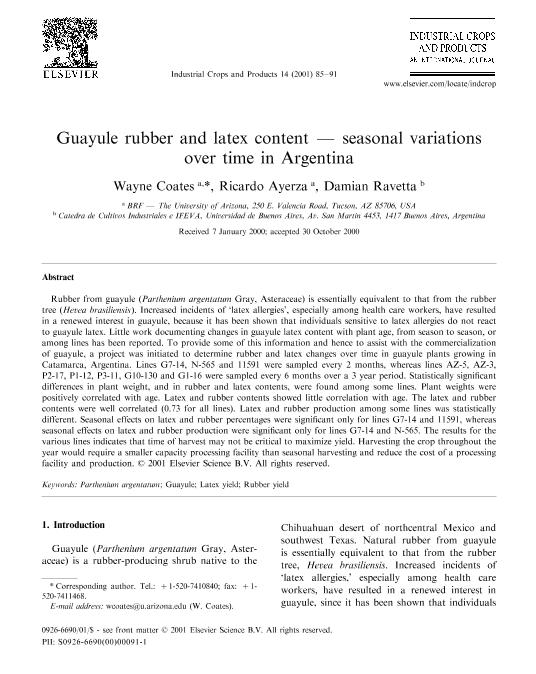Mostrar el registro sencillo del ítem
dc.contributor.author
Coates, W
dc.contributor.author
Ayerza, R
dc.contributor.author
Ravetta, Damián Andrés

dc.date.available
2019-03-15T14:12:50Z
dc.date.issued
2001-03
dc.identifier.citation
Coates, W; Ayerza, R; Ravetta, Damián Andrés; Guayule rubber and latex content — seasonal variations over time in Argentina; Elsevier Science; Industrial Crops and Products; 14; 2; 3-2001; 85-91
dc.identifier.issn
0926-6690
dc.identifier.uri
http://hdl.handle.net/11336/71745
dc.description.abstract
Rubber from guayule (Parthenium argentatum Gray, Asteraceae) is essentially equivalent to that from the rubber tree (Hevea brasiliensis). Increased incidents of 'latex allergies', especially among health care workers, have resulted in a renewed interest in guayule, because it has been shown that individuals sensitive to latex allergies do not react to guayule latex. Little work documenting changes in guayule latex content with plant age, from season to season, or among lines has been reported. To provide some of this information and hence to assist with the commercialization of guayule, a project was initiated to determine rubber and latex changes over time in guayule plants growing in Catamarca, Argentina. Lines G7-14, N-565 and 11591 were sampled every 2 months, whereas lines AZ-5, AZ-3, P2-17, P1-12, P3-11, G10-130 and G1-16 were sampled every 6 months over a 3 year period. Statistically significant differences in plant weight, and in rubber and latex contents, were found among some lines. Plant weights were positively correlated with age. Latex and rubber contents showed little correlation with age. The latex and rubber contents were well correlated (0.73 for all lines). Latex and rubber production among some lines was statistically different. Seasonal effects on latex and rubber percentages were significant only for lines G7-14 and 11591, whereas seasonal effects on latex and rubber production were significant only for lines G7-14 and N-565. The results for the various lines indicates that time of harvest may not be critical to maximize yield. Harvesting the crop throughout the year would require a smaller capacity processing facility than seasonal harvesting and reduce the cost of a processing facility and production. © 2001 Elsevier Science B.V. All rights reserved.
dc.format
application/pdf
dc.language.iso
eng
dc.publisher
Elsevier Science

dc.rights
info:eu-repo/semantics/openAccess
dc.rights.uri
https://creativecommons.org/licenses/by-nc-sa/2.5/ar/
dc.subject
Guayule
dc.subject
Latex Yield
dc.subject
Parthenium Argentatum
dc.subject
Rubber Yield
dc.subject.classification
Ciencias de las Plantas, Botánica

dc.subject.classification
Ciencias Biológicas

dc.subject.classification
CIENCIAS NATURALES Y EXACTAS

dc.title
Guayule rubber and latex content — seasonal variations over time in Argentina
dc.type
info:eu-repo/semantics/article
dc.type
info:ar-repo/semantics/artículo
dc.type
info:eu-repo/semantics/publishedVersion
dc.date.updated
2019-03-14T14:15:42Z
dc.journal.volume
14
dc.journal.number
2
dc.journal.pagination
85-91
dc.journal.pais
Países Bajos

dc.journal.ciudad
Amsterdam
dc.description.fil
Fil: Coates, W. University of Arizona; Estados Unidos
dc.description.fil
Fil: Ayerza, R. University of Arizona; Estados Unidos
dc.description.fil
Fil: Ravetta, Damián Andrés. Consejo Nacional de Investigaciones Científicas y Técnicas. Oficina de Coordinación Administrativa Parque Centenario. Instituto de Investigaciones Fisiológicas y Ecológicas Vinculadas a la Agricultura. Universidad de Buenos Aires. Facultad de Agronomía; Argentina. Universidad de Buenos Aires. Facultad de Agronomía. Departamento de Producción Vegetal. Cátedra de Cultivos Industriales; Argentina
dc.journal.title
Industrial Crops and Products

dc.relation.alternativeid
info:eu-repo/semantics/altIdentifier/url/https://www.sciencedirect.com/science/article/pii/S0926669000000911
dc.relation.alternativeid
info:eu-repo/semantics/altIdentifier/doi/https://doi.org/10.1016/S0926-6690(00)00091-1
Archivos asociados
